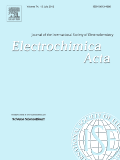
ELECTROCHIMICA ACTA
Scope & Guideline
Catalyzing Knowledge in Electrochemistry Since 1959
Introduction
Aims and Scopes
- Electrochemical Energy Storage Systems:
The journal frequently publishes studies on batteries, supercapacitors, and other energy storage technologies, emphasizing new materials, interfaces, and system designs that improve efficiency and longevity. - Electrocatalysis:
Research on electrocatalysts for various reactions, including oxygen evolution, hydrogen evolution, and CO2 reduction, is a major focus, highlighting the development of novel materials and mechanisms to enhance catalytic performance. - Sensors and Sensing Technologies:
The journal features advancements in electrochemical sensors for detecting various analytes, including environmental pollutants, biomolecules, and pharmaceuticals, often utilizing innovative materials and sensing strategies. - Corrosion and Protection:
Studies addressing the electrochemical aspects of corrosion in various materials, along with the development of inhibitors and protective coatings, are common, contributing to the understanding of material degradation. - Electrochemical Interfaces and Dynamics:
Research into the fundamental aspects of electrochemical interfaces, including charge transfer dynamics, ion transport mechanisms, and solid-electrolyte interphase (SEI) formation, is a recurring theme. - Sustainable and Green Electrochemical Processes:
Papers discussing eco-friendly electrochemical technologies, such as renewable energy conversion and waste recycling through electrochemical methods, are increasingly prevalent.
Trending and Emerging
- High-Performance Nanostructured Electrode Materials:
There is an increasing focus on nanostructured materials that enhance electrochemical performance, including hybrid and composite materials designed for batteries and supercapacitors. - Machine Learning and Data-Driven Approaches:
Machine learning techniques are being applied to electrochemical research, particularly in modeling and predicting the performance of electrochemical systems and materials. - Electrochemical Water Splitting and Hydrogen Production:
Research dedicated to improving the efficiency and stability of electrochemical water splitting for hydrogen production is on the rise, driven by the push for clean energy technologies. - Electrochemical Systems for Environmental Remediation:
There is a growing interest in using electrochemical methods for environmental applications, such as the degradation of pollutants and the recovery of valuable materials from waste. - Interface Engineering and Solid Electrolyte Interphases (SEI):
Research on the engineering of interfaces and SEI for improved performance in batteries and supercapacitors has become a hot topic, focusing on enhancing stability and ionic conductivity. - Biomimetic and Bioinspired Electrochemical Systems:
The exploration of biomimetic and bioinspired electrochemical systems, leveraging natural processes for energy conversion and storage, is gaining traction.
Declining or Waning
- Traditional Electrode Materials:
There has been a shift away from conventional electrode materials like pure metals and simple oxides towards more complex, composite, and nanostructured materials, leading to a waning interest in older methodologies. - Basic Electrochemical Theory:
Research purely focused on basic electrochemical theory and models without practical applications is less common, as the journal increasingly prioritizes studies with real-world implications. - Single-Use and Non-Recyclable Materials:
The trend toward sustainability has led to a decline in publications centered on single-use materials that do not contribute to recycling efforts, as researchers move toward more sustainable alternatives. - Low-Temperature Electrochemical Processes:
Research on low-temperature electrochemical processes has become less prominent, as there is a growing emphasis on high-performance systems that operate effectively at ambient or elevated temperatures.
Similar Journals
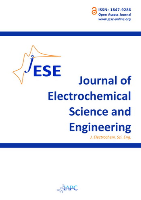
Journal of Electrochemical Science and Engineering
Unlocking Innovations in Electrochemistry and Engineering.The Journal of Electrochemical Science and Engineering, published by the International Association of Physical Chemists (IAPC), serves as a vital resource for researchers and professionals in the fields of electrochemistry, materials chemistry, and chemical engineering. With an Open Access model since 2011, this journal ensures that groundbreaking research is freely accessible to a global audience, promoting collaboration and knowledge sharing. Situated in Croatia, it showcases cutting-edge developments while focusing on applied aspects related to electrochemical technologies. Notably, the journal holds a commendable Scopus ranking, placing it within the Q3 quartile for multiple categories, including Chemical Engineering (miscellaneous) and Electrochemistry. By fostering innovative research and comprehensive reviews, the Journal of Electrochemical Science and Engineering plays a crucial role in advancing the understanding and application of electrochemical processes, making it an indispensable platform for academics and practitioners alike.
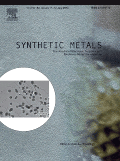
SYNTHETIC METALS
Pioneering Research in Condensed Matter Physics.SYNTHETIC METALS is a leading academic journal published by Elsevier Science SA, focusing on the interdisciplinary field of materials science with an emphasis on the development and application of synthetic metallic materials. Established in 1979, this esteemed journal offers a platform for innovative research that promotes advancements in condensed matter physics, electronic materials, materials chemistry, and mechanical engineering. With an impressive Q1 ranking in Metals and Alloys and Q2 rankings across various other categories, SYNTHETIC METALS serves as a vital resource for researchers, professionals, and students seeking to explore complex material systems and their applications in industry. Although it does not currently offer open access, the journal's impact is highlighted by its robust Scopus rankings, ensuring high visibility and dissemination of meaningful research outcomes. As it progresses through its convergence period to 2024, SYNTHETIC METALS remains dedicated to advancing knowledge and fostering scientific inquiry in the field of materials science.
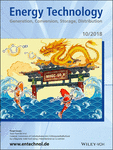
Energy Technology
Pioneering Insights into Renewable Energy AdvancesEnergy Technology, published by Wiley-VCH Verlag GmbH, is a prominent peer-reviewed journal dedicated to advancing the field of energy research and technology. With an ISSN of 2194-4288 and an E-ISSN of 2194-4296, this journal has made a significant impact in the energy sector, holding a Q2 category ranking in the Energy (miscellaneous) category for 2023, and proudly positioned in the 77th percentile within the Scopus ranking for General Energy. Since its inception in 2013, Energy Technology has consistently published cutting-edge research, innovations, and reviews that cater to a wide array of topics including renewable energy, sustainable technologies, and energy efficiency. The journal does not offer open access, yet it remains a key resource for researchers, professionals, and students who are committed to exploring the dynamic field of energy. The journal's efforts to disseminate rigorous scholarship make it an invaluable asset for anyone looking to contribute to or understand the future of energy-related technologies until 2024.

Journal of Electrochemical Science and Technology
Advancing the Frontiers of Electrochemical ResearchJournal of Electrochemical Science and Technology, with the ISSN 2093-8551, is a distinguished publication in the field of electrochemistry, disseminated by the Korean Electrochemistry Society. Based in South Korea, the journal has made significant strides since its inception in 2014, showcasing groundbreaking research that spans various applications of electrochemical science. Currently ranked in the Q2 category for Electrochemistry, it occupies an emerging position within the academic community, evidenced by its Scopus rank of #25 out of 60 in the Electrochemistry domain, placing it in the 59th percentile. Although the journal follows a traditional access model, it remains committed to providing high-quality, peer-reviewed content that fuels innovation and scholarly dialogue. With objectives firmly rooted in advancing the understanding and application of electrochemical phenomena, this journal serves as a crucial resource for researchers, professionals, and students alike, striving to push the boundaries of the electrochemical sciences.

Journal of Energy Storage
Innovating the future of energy storage technology.Welcome to the Journal of Energy Storage, a premier publication dedicated to advancing the science and technology of energy storage systems. Published by ELSEVIER in the Netherlands, this esteemed journal boasts a significant impact in the field, categorized as Q1 in Electrical and Electronic Engineering, Energy Engineering and Power Technology, and Renewable Energy, Sustainability and the Environment for 2023. With a commitment to disseminating high-quality research, the journal provides a platform for the latest innovations and findings, covering a broad spectrum of topics from battery technologies to thermal energy storage. As a must-read for researchers, professionals, and students alike, the Journal of Energy Storage facilitates vital discussions that shape the future of sustainable energy practices. While presently offering select access options, the journal continues to expand its reach and influence within the academic community, encouraging submissions that drive forward our understanding of energy solutions. Discover the forefront of energy storage research and contribute to a world increasingly reliant on efficient energy management.

Electrochemical Science Advances
Exploring the Frontiers of Electrochemical TechnologyElectrochemical Science Advances, published by WILEY, is an esteemed Open Access journal that has been making significant contributions to the field of electrochemistry since its inception in 2021. With an ISSN of 2698-5977, this journal serves as a vital platform for researchers and practitioners looking to disseminate their findings on a diverse range of topics within the electrochemical sciences and related areas. The journal has achieved commendable rankings in the Scopus database, placing it in the 2nd quartile in Chemistry (miscellaneous) and the 3rd quartile in Electrochemistry, highlighting its relevance and growing influence in the academic community. As it converges from 2021 to 2024, Electrochemical Science Advances aims to foster collaboration and innovation, offering a vital resource for students, professionals, and researchers dedicated to advancing knowledge and technology in electrochemistry. Access to this cutting-edge research is straightforward, allowing for a comprehensive engagement with the latest advances in the field.
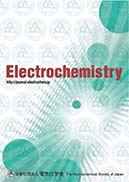
ELECTROCHEMISTRY
Connecting Global Minds in Electrochemical TechnologyELECTROCHEMISTRY is an esteemed journal published by the Electrochemical Society of Japan, dedicated to advancing the field of electrochemical science and technology. With an ISSN of 1344-3542 and an E-ISSN of 2186-2451, this journal has been providing a platform for scholarly communication since its inception in 1996, with a converged scope extending to 2024. As an Open Access publication since 2020, it facilitates the wide dissemination of research, fostering collaboration among researchers, professionals, and students alike. Currently positioned in Q3 of the electrochemistry category and ranking 52 out of 60 in Scopus, ELECTROCHEMISTRY is committed to publishing high-quality, peer-reviewed articles that explore novel electrochemical systems, applications, and methodologies. With its base in Tokyo, Japan, the journal serves a global audience, promoting cutting-edge research that drives innovation in energy, materials science, and analytical chemistry.

JOURNAL OF THE ELECTROCHEMICAL SOCIETY
Driving Theoretical and Experimental Breakthroughs in ElectrochemistryJOURNAL OF THE ELECTROCHEMICAL SOCIETY, published by the ELECTROCHEMICAL SOCIETY INC, is a leading peer-reviewed academic journal dedicated to advancing the field of electrochemistry and its myriad applications. With an ISSN of 0013-4651 and E-ISSN of 1945-7111, this esteemed journal has been a pivotal platform for research since its inception in 1948, with convergence periods allowing for a rich historical context of study through to 2024. Recognized for its high impact, it holds a noteworthy Q1 ranking in several categories including Condensed Matter Physics and Materials Chemistry, and it is Q2 ranked in both Electrochemistry and Renewable Energy. This journal features a range of articles that encompass both theoretical and experimental advancements, making it a crucial resource for researchers, professionals, and students keen on exploring cutting-edge developments in materials science, energy solutions, and sustainable technologies. Although it is not an open access journal, its rigorous standards ensure that published work significantly contributes to the body of knowledge within its fields, fostering innovative research and collaborative progress.

RUSSIAN JOURNAL OF ELECTROCHEMISTRY
Empowering the Future of Electrochemical ResearchThe Russian Journal of Electrochemistry, published by Pleiades Publishing Inc, is a reputable scientific resource that caters to the dynamic field of electrochemistry. Since its inception in 1996, this journal has become a platform for the dissemination of cutting-edge research, exploring both foundational studies and innovative applications within electrochemical science. Despite currently holding a Q4 categorization in its field, the journal is dedicated to enhancing its scholarly impact and visibility, reflecting its commitment to fostering advancements in electrochemical technologies. With its ISSN 1023-1935 and E-ISSN 1608-3342, the journal strives to reach a global audience of researchers, professionals, and students alike. Though the journal is not open access, its contents are crucial for anyone looking to stay at the forefront of electrochemical research and developments. The journal's editorial board includes well-respected experts, ensuring that published articles contribute significantly to the scientific community and pave the way for future innovations in the field.

Energy Materials
Exploring Breakthroughs in Energy Materials Science.Energy Materials is a pioneering journal published by OAE PUBLISHING INC, dedicated to the dynamic field of energy materials science and engineering. With a focus on advancing knowledge related to materials used in various energy applications such as batteries, fuel cells, and solar cells, this open-access journal aims to disseminate cutting-edge research and innovative methodologies to a global audience. By offering a platform for original research, reviews, and case studies, Energy Materials plays a crucial role in bridging the gap between materials science and energy technology, facilitating the development of sustainable energy solutions. Researchers, professionals, and students alike will find invaluable insights in its pages, fostering advancements in this essential sector. To explore the latest developments in energy materials, visit Energy Materials at OAE PUBLISHING INC.